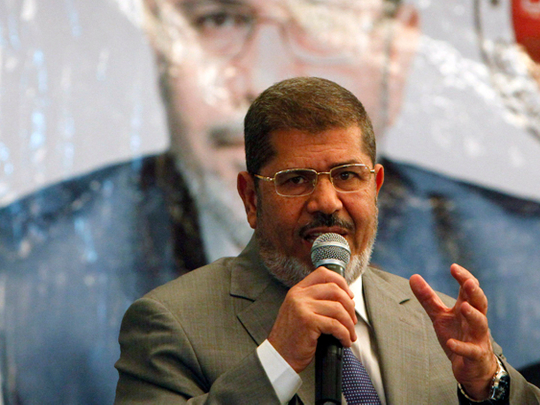
To the surprise of many so-called US experts in the Arab world, the Obama administration did not seem bothered by Egypt President Mohammad Mursi’s bold move to sack his military chiefs. Taking advantage of the killing of 16 Egyptian soldiers in northern Sinai last week, an incident that deeply embarrassed the generals, Mursi forced the retirement of his powerful defence minister, the army chief of staff and other senior generals, stripping the military for the first time from the overall political power it had seized since the 1952 military coup against the monarchy.
Mursi did not only fire his top army officers, but also nullified a constitutional declaration issued by the military before he took office on June 30. The constitutional declaration was meant to hamstring the power of the elected president and to keep him as a ceremonial head of state. Mursi replaced it with his own declaration, one that gives him broad legislative and executive powers.
Mursi’s aggressive move took many by surprise. Few had expected him to take the unusual step of challenging the powerful military establishment.
Until last week, Mursi was largely seen as a weak president, hesitant and lacklustre. This perception was further consolidated when he was forced last month by the pro-military Supreme Constitutional Court to back off after an attempt to reinstate the Islamically-dominated parliament, which has been previously dismissed by the military.
By removing Egypt’s defacto military rulers, Mursi has in practical terms cemented a major shift in power; one that has taken authority from the military and put it in the hands of elected politicians.
The US has been closely watching the power struggle between the army and the Muslim Brotherhood, from within which Mursi ascended to the presidency. It was not unhappy, to say the least, by the president’s coup against his military chiefs. More important, perhaps, the new US position represents a radical shift from a six-decade old policy which had always favoured military rule over civilian administration.
Since the late 1940s, modernisation theories in the US have regarded conservative Arab societies as a major hurdle towards the establishment of modern and functioning democracies in the region.
Acting on this belief, the US government received positively the coup of the free officers in Egypt and did not seem to be bothered by the toppling of the Iraqi royal family in 1958.
It, furthermore, assisted the first Syrian military coup in 1949 and is believed to have had connections with the third one.
The overriding argument was that an Ataturk-like leader was better equipped to start a modernisation process from the top, attempting to change, forcibly if necessary, the conservative culture of Middle Eastern societies.
The past six decades have shown that military rulers in the Arab world have been a great deal more reluctant to democratise, or even modernise, than had been initially anticipated.
In Egypt, Libya, Syria and Iraq, where western-oriented military elites overthrew traditional or conservative regimes, a police state was established, corruption became institutionalised, poverty increased and the state-central planning lagged far behind the annual rate of population growth.
By contrast, the more conservative civilian regimes, which survived the revolutionary tide of the 1950s and 1960s, proved to be more rational, adapting quickly to rapidly changing regional and international conditions. In addition, most conservative Arab regimes have understood the implications of big international events, such as the collapse of the Soviet Union, the 1991 Gulf War and the latest war on Iraq. They undertook limited, but vital steps, towards democratisation. The secular military regimes, by comparison, resisted change and tried to thwart any attempt towards democratisation, or even some sort of political liberalisation.
The US reaction to Mursi’s move to reclaim his power as an elected civilian president, representing a conservative political movement (the Ikhwan), signifies a change in Washington’s thinking.
Despite the fact that the Obama administration did not comment directly on the removal of Egypt’s military rulers, given the strong ties between the US and the Egyptian army, one would find it extremely difficult to imagine that the US did not restrain the military from lashing out.
Many even believe that the US has warned the military against any attempt to thwart the new established democratic process in Cairo.
Similarly, the pro-military Supreme Constitutional Court has also refrained from challenging the president on his decision to nullify the constitutional declaration.
If Washington did really approve the change in Egypt that would indeed signify a radical shift its Middle East policy.
Dr Marwan Kabalan is dean of the Faculty of International Relations and Diplomacy at the University of Kalamoon, Damascus.








